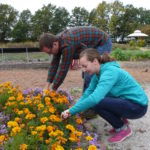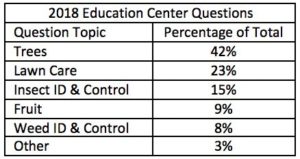The Cooperative Extension Service is a national network of land-grant colleges, universities, and the United States Department of Agriculture serving communities across the country by providing research-based information and educational programming. Purdue Extension serves Indiana residents in the following program areas: Agriculture and Natural Resources, Health and Human Sciences, Community Development, and 4-H Youth Development. Purdue Extension offices are located in all 92 Indiana counties!

Photo 1: Purdue Master Gardeners in Tippecanoe County maintaining an educational demonstration garden. (Photo courtesy of Purdue Ag Communications)
One of Purdue Extension’s signature programs is the Purdue Master Gardener Program. The purpose of the Purdue Master Gardener Program is to train volunteers to assist Purdue Extension Offices with consumer horticulture education needs in local communities. Purdue Master Gardeners complete horticultural training in a variety of topics from plant and soil science to fruit, vegetable, and ornamental gardening. The Purdue Master Gardener Basic Training is conducted by Purdue Extension Educators in participating Indiana Counties. To become a Purdue Master Gardener Intern, participants must complete the application and screening requirements, pay the local fees, complete the Purdue Master Gardener Basic Training, and pass an exam over the material presented with a score of 70% or above. In order to become certified, interns are required to complete at least 35 hours of volunteer activity approved by their local Purdue Extension Educator (Master Gardener County Coordinator). Volunteer activities performed by Purdue Master Gardeners fulfill the program’s purpose of educating Indiana residents in the area of home horticulture and gardening. Purdue Master Gardener volunteers can earn Advanced Master Gardener levels for their work. Purdue Master Gardeners are required to complete a minimum of 12 volunteer hours and 6 educational training hours per year to remain active in the program and continue their training in home horticulture. During 2018, 2,808 Purdue Master Gardener volunteers contributed 175,641 volunteer hours valued at over $4.0 million!
Purdue Master Gardeners make a difference in the lives of others by sharing their gardening knowledge. Purdue Master Gardeners across the state have coordinated educational bus tours, held social functions to learn about gardening from each other, taught youth gardening classes, and conducted gardening seminars to educate the public. Some Purdue Extension offices offer education centers where Purdue Master Gardener volunteers are trained to assist Purdue Extension with home horticulture questions from local residents. The local Purdue Extension Educator, Agriculture and Natural Resources, supervises and provides ongoing training for Master Gardeners who staff the education centers. These valuable volunteers learn about working with the public and receive advanced training in diagnosis of home horticulture related plant problems. In 2018, the majority of questions answered at the Tippecanoe County Education Center were regarding trees at 42% of the total questions followed by lawn questions at 23%. The most common question of 2018 was “Why is my tree dying?” Although there were a variety of reasons for trees dying in Tippecanoe County, the most common cause for tree dieback was root girdling, which is ultimately caused by improper planting. With the 2019 season just beginning, we are seeing a similar trend with more questions regarding trees.

Photo 2: Purdue Master Gardener, Kathryn Reeves of Tippecanoe County, answers home gardening questions in the Education Center. (Photo by Karen Mitchell)
Indiana residents with gardening, lawn, and landscape questions are encouraged to contact their local Purdue Extension office (https://extension.purdue.edu/about#counties)! A trained Purdue Extension Educator can assist you by providing research-based nonbiased information from Purdue Extension experts. Likewise, the Purdue Extension Consumer Horticulture website offers extension publications and articles to assist the home gardener (https://www.purdue.edu/hla/sites/yardandgarden/). People interested in the Purdue Master Gardener Program are encouraged to contact their local Purdue Extension Office for more information about a Purdue Master Gardener Basic Training scheduled in a county near them (www.hort.purdue.edu/mg).
Related Websites:
Purdue Extension: https://extension.purdue.edu/
Purdue Extension County offices: https://extension.purdue.edu/about#counties
Purdue Extension Consumer Horticulture: https://www.purdue.edu/hla/sites/yardandgarden/
Purdue Master Gardener Program: www.hort.purdue.edu/mg
Purdue Master Gardener Basic Trainings: https://www.purdue.edu/hla/sites/master-gardener/events/categories/2019-purdue-mg-basic-trainings/
Purdue Plant Doctor Apps: https://www.purdueplantdoctor.com/
Purdue Plant and Pest Diagnostic Lab: https://ag.purdue.edu/btny/ppdl/Pages/default.aspx